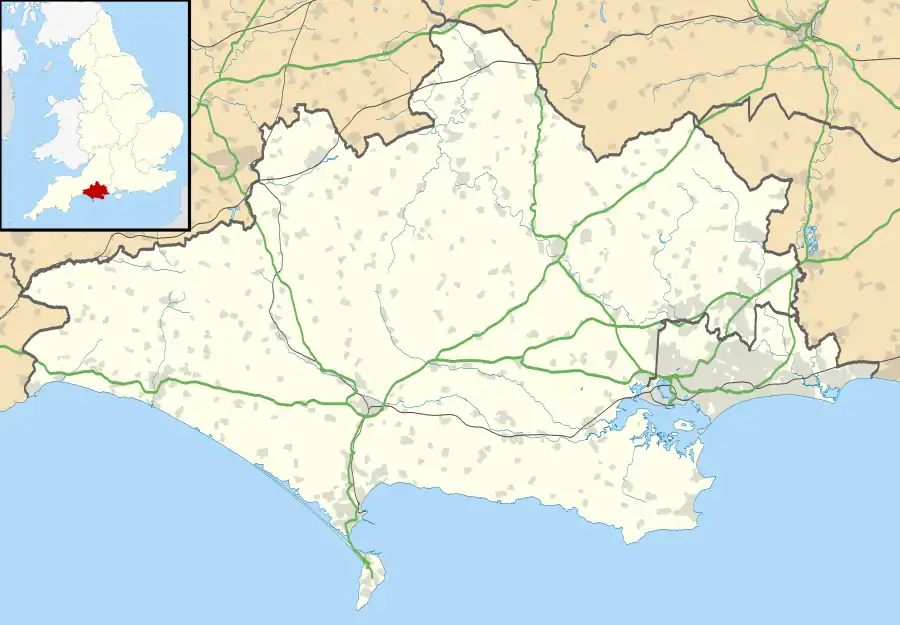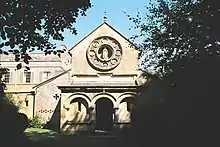Chideock
Chideock (/ˈtʃɪdək/ CHID-ək) is a village and civil parish in south west Dorset, England, situated close to the English Channel between Bridport and Lyme Regis. Dorset County Council's 2013 estimate of the parish population is 550.
| Chideock | |
|---|---|
 The main road in Chideock | |
 Chideock Location within Dorset | |
| Population | 550 [1] |
| OS grid reference | SY423928 |
| Unitary authority | |
| Shire county | |
| Region | |
| Country | England |
| Sovereign state | United Kingdom |
| Post town | Bridport |
| Postcode district | DT6 |
| Police | Dorset |
| Fire | Dorset and Wiltshire |
| Ambulance | South Western |
| UK Parliament |
|
| Website | Village website |

Chideock's economy mostly comprises agriculture (arable and pastoral) and tourism. The parish includes part of the Jurassic Coast, a World Heritage Site.
During much of its history Chideock has had a strong tradition of Catholicism; in the late 16th century four Chideock men were executed for their faith and became known as the Chideock Martyrs. There is a memorial to the men in the village.
The A35 trunk road passes through the village, which means the main street can have high volumes of traffic.
History
In 1086 Chideock was recorded in the Domesday Book as 'Cidihoc'.[2] In 1379–80 John de Chideock, a manorial lord, built Chideock Castle just north of the village.[2][3][4] During the Middle Ages ownership passed to the Catholic Arundell family, who used it to provide refuge for priests and loyal followers during subsequent religious persecution.[4] During the Protestant reign of Elizabeth I the Arundell estate became Dorset's main centre of Catholicism,[5] and the locality witnessed considerable religious strife.[2] Four local Catholic men—John Cornelius, Thomas Bosgrave, John Carey and Patrick Salmon[4]—were martyred in the late 16th century; their trial took place in the main hall of what is now Chideock House Hotel and they were executed in Dorchester. The men became known as the Chideock Martyrs.[2][4] A fifth man, Hugh Green, who became Chideock's chaplain in 1612, was tried and executed in 1642. All five were beatified on 15 December 1929.[4]
During the English Civil War Chideock was a royalist stronghold,[4] and the castle changed hands more than once before it was ultimately left ruinous in 1645 by parliamentarian forces under the Governor of Lyme Regis, Colonel Ceeley.[2][3][4] Chideock House Hotel may have been the headquarters of General Fairfax as he planned the castle's overthrowing. Parts of the castle remained standing until at least 1733[3] but only some of the moat can be seen today; it is in a field, accessed by Ruins Lane, and marked by a crucifix as a memorial to the martyrs.[2][3]

In 1802 the Arundells were succeeded by the Weld family of Lulworth Castle who in 1810 built Chideock Manor.[2] The Welds were also Catholic and in 1870-2 Charles Weld designed and built the village's Roman Catholic church in an unusual Romanesque style. It is dedicated to Our Lady Queen of Martyrs, and St Ignatius and remains in trust to the Weld family.[2][6]
Among other surviving relics claimed by this location is St. Thomas More's hair shirt, sent to Margaret Roper the day before his martyrdom and later presented for safe keeping by Margaret Clement.[7] This was long in the custody of the community of Augustinian canonesses who, until 1983, lived at the convent at Abbotskerswell Priory, Devon.[8][9] More recent sources, however, state that the shirt is now preserved at the Roman Catholic Buckfast Abbey, part of a Benedictine monastery, in Devon.[10][11][12]
Governance
Chideock is in the electoral ward of Chideock and Symondsbury, which encompasses much of the coast between Charmouth and West Bay plus inland beyond Symondsbury. The total population of this ward is 1,745.[13] This ward is one of 32 that comprise the West Dorset parliamentary constituency, which is currently represented in the UK national parliament by the Conservative Chris Loder.
Geography

Chideock is situated in the Dorset Council administrative area about 2.5 miles (4.0 km) west of Bridport, 5 miles (8.0 km) east of Lyme Regis and 0.75 miles (1.21 km) inland from the English Channel. The parish includes the coastal hamlet of Seatown, which is less than 1 mile (1.6 km) to the south on the Jurassic Coast, a World Heritage Site. Seatown has a long shelving pebble beach, with views up towards the hill which forms Golden Cap, which at 191 metres (627 ft) is the highest cliff on the south coast of England. Fossilised ammonites and belemnites can often be found on the beach due to continued coastal erosion of the soft blue lias clays which make up the cliffs. Iron-rich rocks such as lodestone and magnetite can also be found on the beaches near the village – these are thought to have been transported down the coast from Chesil Beach, having been deposited there by a shipwreck in the 1800s. Similar collections of these rocks can be found on beaches along the Jurassic Coast and in the neighbouring counties of Hampshire and the Isle of Wight.
Demography
Dorset County Council's 2013 estimate of the parish population is 550.[1]
The population of the parish in the censuses between 1921 and 2001 is shown in the table below:
| Census Population of Chideock Parish 1921—2001 (except 1941) | ||||||||||||||
|---|---|---|---|---|---|---|---|---|---|---|---|---|---|---|
| Census | 1921 | 1931 | 1951 | 1961 | 1971 | 1981 | 1991 | 2001 | ||||||
| Population | 548 | 542 | 610 | 559 | 560 | 650 | 690 | 600 | ||||||
| Source:Dorset County Council[14] | ||||||||||||||
Results of the 2011 census have been published for the combined populations of Chideock parish and the small neighbouring parish of Stanton St Gabriel; the combined population was 686.[15]
Transport
The A35 trunk road between Honiton and Southampton passes through Chideock, which in 1997 was the first village in Britain to have two speed cameras installed in response to perceived excessive speed.[16] The National Trust refused permission for a prospective bypass[16] over land it owns to the north of Golden Cap, citing its importance as an area of natural beauty. On 4 May 2010 a protest against the lack of a bypass was initiated by some residents and involved constant operation of a pedestrian crossing at the centre of the village for one hour's duration every week.[17] This campaign continued for a year and may result in restrictions on heavy goods vehicles in the village.[18]
References
- "Parish Population Data". Dorset County Council. 20 January 2015. Retrieved 28 February 2015.
- Roland Gant (1980). Dorset Villages. Robert Hale Ltd. pp. 122–3. ISBN 0-7091-8135-3.
- Reginald J W Hammond (1979). Dorset Coast (4 ed.). Ward Lock Ltd. pp. 36–7. ISBN 0-7063-5494-X.
- Peter Booton (May 2012). "Booton Foot Trails: Chideock, Golden Cap and Seatown". Dorset Life Magazine. Retrieved 22 January 2014.
- J.H. Bettey (1974). Dorset. David & Charles. p. 99. ISBN 0-7153-6371-9.
- "History - Chideock Martyrs Church". Retrieved 21 August 2016.
- "St. Thomas More". Catholic Encyclopaedia..
- Hilliam, David (26 December 2010). Little Book of Dorset. The History Press. ISBN 978-0-7524-6265-3.
- Vail, Anne (2004). Shrines of Our Lady in England. Gracewing Publishing. p. 42. ISBN 978-0-85244-603-4.
- "With public rosaries, priest prays for peace, healing after shooting". 15 April 2021. Archived from the original on 22 November 2016.
- "St Thomas More's Hair Shirt Enshrined for Public Veneration – Royal Central". royalcentral.co.uk. Archived from the original on 27 November 2016. Retrieved 13 January 2022.
- "Hair-shirt worn by St Thomas More is enshrined for public veneration for possibly the first time - the Diocese of Shrewsbury - the Diocese of Shrewsbury".
- "Chideock and Symondsbury ward 2011". Retrieved 26 February 2015.
- "Parishes (A-L), 1921-2001- Census Years". Dorset County Council. 17 March 2010. Retrieved 14 March 2014.
- "Area: Chideock (Parish). Key Figures for 2011 Census: Key Statistics". Office for National Statistics. Archived from the original on 3 February 2014. Retrieved 22 January 2014.
- Clive Aslet (2011). Villages of Britain: The Five Hundred Villages that Made the Countryside. Bloomsbury Publishing. ISBN 9781608196722.
- "Protest pensioner halts traffic". 5 May 2010. Retrieved 21 August 2016 – via bbc.co.uk.
- "Light at the end of tunnel for Dorset road campaign?". 3 June 2011. Archived from the original on 21 January 2013. Retrieved 21 August 2016.
